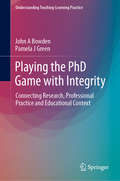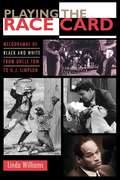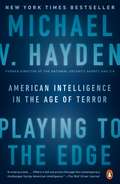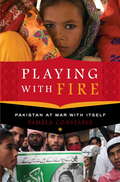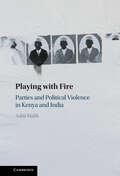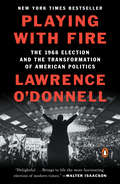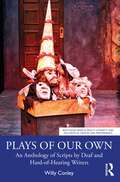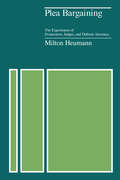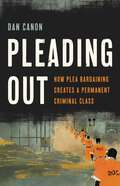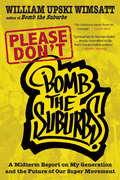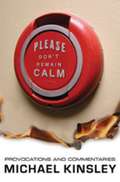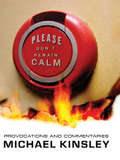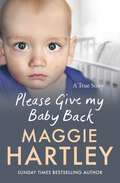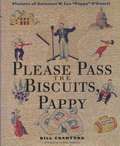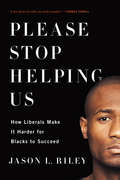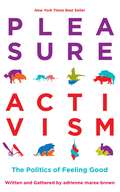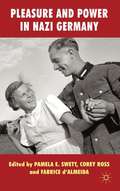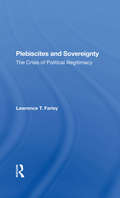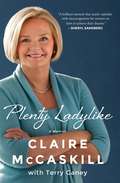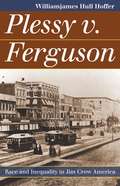- Table View
- List View
Playing the PhD Game with Integrity: Connecting Research, Professional Practice and Educational Context (Understanding Teaching-Learning Practice)
by John A Bowden Pamela J GreenThis book focuses on integrity throughout the PhD journey and beyond, and is organised around two main themes: (1) integrity in relation to the capabilities developed by doctoral candidates for professional practice; and (2) integrity and coherence at the PhD system level. The working methods of key participants such as PhD candidates, supervisors, university managers, government agencies and politicians are central to achieving integrity goals within PhD programmes. In this context, a number of constructs are developed that inform the practice-based elements of the book in relation to conducting doctoral research, research supervision, academic writing, and research training support systems; in particular, these include our Moral Compass Framework for professional integrity, notions of collective morality, decision-making when faced with ‘wicked’ problems, connected moral capability and our double-helix model of capability development, negotiated sense in contrast with common sense, completion mindsets and contexts, mindfulness, liminality, and mutual catalysis in joint authorship.While the data the book employs stems from practice-led research within the Australian doctoral system, the conclusions drawn are of global relevance. Throughout the book, wherever appropriate, comparisons are made between the Australian context and other contexts, such as the doctoral systems of the United Kingdom, Europe and the United States.
Playing the Race Card: Melodramas of Black and White from Uncle Tom to O. J. Simpson
by Linda WilliamsThe black man suffering at the hands of whites, the white woman sexually threatened by the black man. Both images have long been burned into the American conscience through popular entertainment, and today they exert a powerful and disturbing influence on Americans' understanding of race. So argues Linda Williams in this boldly inquisitive book, where she probes the bitterly divisive racial sentiments aroused by such recent events as O. J. Simpson's criminal trial. Williams, the author of Hard Core, explores how these images took root, beginning with melodramatic theater, where suffering characters acquire virtue through victimization. The racial sympathies and hostilities that surfaced during the trial of the police in the beating of Rodney King and in the O. J. Simpson murder trial are grounded in the melodramatic forms of Uncle Tom's Cabin and The Birth of a Nation. Williams finds that Stowe's beaten black man and Griffith's endangered white woman appear repeatedly throughout popular entertainment, promoting interracial understanding at one moment, interracial hate at another. The black and white racial melodrama has galvanized emotions and fueled the importance of new media forms, such as serious, "integrated" musicals of stage and film, including The Jazz Singer and Show Boat. It also helped create a major event out of the movie Gone With the Wind, while enabling television to assume new moral purpose with the broadcast of Roots. Williams demonstrates how such developments converged to make the televised race trial a form of national entertainment. When prosecutor Christopher Darden accused Simpson's defense team of "playing the race card," which ultimately trumped his own team's gender card, he feared that the jury's sympathy for a targeted black man would be at the expense of the abused white wife. The jury's verdict, Williams concludes, was determined not so much by facts as by the cultural forces of racial melodrama long in the making. Revealing melodrama to be a key element in American culture, Williams argues that the race images it has promoted are deeply ingrained in our minds and that there can be no honest discussion about race until Americans recognize this predicament.
Playing to Win: An Insider's Guide to Politics
by Jeff GreenfieldIncludes topics such as Understanding the Political Terrain, Getting Into the Game, Choosing Your Campaign Issues, and How to give speeches, use the media, advertise, debate, get re-elected, and make things better.
Playing to the Edge: American Intelligence in the Age of Terror
by Michael V. HaydenAn unprecedented high-level master narrative of America's intelligence wars, from the only person ever to helm both CIA and NSA, at a time of heinous new threats and wrenching change For General Michael Hayden, playing to the edge means playing so close to the line that you get chalk dust on your cleats. Otherwise, by playing back, you may protect yourself, but you will be less successful in protecting America. "Play to the edge" was Hayden's guiding principle when he ran the National Security Agency, and it remained so when he ran CIA. In his view, many shortsighted and uninformed people are quick to criticize, and this book will give them much to chew on but little easy comfort; it is an unapologetic insider's look told from the perspective of the people who faced awesome responsibilities head on, in the moment. How did American intelligence respond to terrorism, a major war and the most sweeping technological revolution in the last 500 years? What was NSA before 9/11 and how did it change in its aftermath? Why did NSA begin the controversial terrorist surveillance program that included the acquisition of domestic phone records? What else was set in motion during this period that formed the backdrop for the infamous Snowden revelations in 2013? As Director of CIA in the last three years of the Bush administration, Hayden had to deal with the rendition, detention and interrogation program as bequeathed to him by his predecessors. He also had to ramp up the agency to support its role in the targeted killing program that began to dramatically increase in July 2008. This was a time of great crisis at CIA, and some agency veterans have credited Hayden with actually saving the agency. He himself won't go that far, but he freely acknowledges that CIA helped turn the American security establishment into the most effective killing machine in the history of armed conflict. For 10 years, then, General Michael Hayden was a participant in some of the most telling events in the annals of American national security. General Hayden's goals are in writing this book are simple and unwavering: No apologies. No excuses. Just what happened. And why. As he writes, "There is a story here that deserves to be told, without varnish and without spin. My view is my view, and others will certainly have different perspectives, but this view deserves to be told to create as complete a history as possible of these turbulent times. I bear no grudges, or at least not many, but I do want this to be a straightforward and readable history for that slice of the American population who depend on and appreciate intelligence, but who do not have the time to master its many obscure characteristics."From the Hardcover edition.
Playing to the Edge: American Intelligence in the Age of Terror
by Michael V. HaydenAn unprecedented high-level master narrative of America's intelligence wars, from the only person ever to helm both CIA and NSA, at a time of heinous new threats and wrenching change<P><P> For General Michael Hayden, playing to the edge means playing so close to the line that you get chalk dust on your cleats. Otherwise, by playing back, you may protect yourself, but you will be less successful in protecting America. "Play to the edge" was Hayden's guiding principle when he ran the National Security Agency, and it remained so when he ran CIA. In his view, many shortsighted and uninformed people are quick to criticize, and this book will give them much to chew on but little easy comfort; it is an unapologetic insider's look told from the perspective of the people who faced awesome responsibilities head on, in the moment. <P> How did American intelligence respond to terrorism, a major war and the most sweeping technological revolution in the last 500 years? What was NSA before 9/11 and how did it change in its aftermath? Why did NSA begin the controversial terrorist surveillance program that included the acquisition of domestic phone records? What else was set in motion during this period that formed the backdrop for the infamous Snowden revelations in 2013? <P> As Director of CIA in the last three years of the Bush administration, Hayden had to deal with the rendition, detention and interrogation program as bequeathed to him by his predecessors. He also had to ramp up the agency to support its role in the targeted killing program that began to dramatically increase in July 2008. This was a time of great crisis at CIA, and some agency veterans have credited Hayden with actually saving the agency. He himself won't go that far, but he freely acknowledges that CIA helped turn the American security establishment into the most effective killing machine in the history of armed conflict.<P> For 10 years, then, General Michael Hayden was a participant in some of the most telling events in the annals of American national security. General Hayden's goals are in writing this book are simple and unwavering: No apologies. No excuses. Just what happened. And why. As he writes, "There is a story here that deserves to be told, without varnish and without spin. My view is my view, and others will certainly have different perspectives, but this view deserves to be told to create as complete a history as possible of these turbulent times. I bear no grudges, or at least not many, but I do want this to be a straightforward and readable history for that slice of the American population who depend on and appreciate intelligence, but who do not have the time to master its many obscure characteristics." <P><b>A New York Times Bestseller</b>
Playing with Fire
by Pamela ConstableA volatile nation at the heart of major cultural, political, and religious conflicts in the world today, Pakistan commands our attention. Yet more than six decades after the country's founding as a Muslim democracy, it continues to struggle over its basic identity, alliances, and direction. In Playing with Fire, acclaimed journalist Pamela Constable peels back layers of contradiction and confusion to reveal the true face of modern Pakistan.In this richly reported and movingly written chronicle, Constable takes us on a panoramic tour of contemporary Pakistan, exploring the fears and frustrations, dreams and beliefs, that animate the lives of ordinary citizens in this nuclear-armed nation of 170 million. From the opulent, insular salons of the elite to the brick quarries where soot-covered workers sell their kidneys to get out of debt, this is a haunting portrait of a society riven by inequality and corruption, and increasingly divided by competing versions of Islam.Beneath the façade of democracy in Pakistan, Constable reveals the formidable hold of its business, bureaucratic, and military elites--including the country's powerful spy agency, the ISI. This is a society where the majority of the population feels powerless, and radical Islamist groups stoke popular resentment to recruit shock troops for global jihad. Writing with an uncommon ear for the nuances of this conflicted culture, Constable explores the extent to which faith permeates every level of Pakistani society--and the ambivalence many Muslims feel about the role it should play in the life of the nation.Both an empathic and alarming look inside one of the world's most violent and vexing countries, Playing with Fire is essential reading for anyone wishing to understand modern Pakistan and its momentous role on today's global stage.From the Hardcover edition.
Playing with Fire: Parties and Political Violence in Kenya and India
by Aditi MalikDrawing on a rare cross-regional comparison of Kenya and India, Playing with Fire develops a novel explanation about ethnic party violence. Combining rich historical, qualitative, and quantitative data, the book demonstrates how levels of party instability can crucially inform the decisions of political elites to organize or support violence. Centrally, it shows that settings marked by unstable parties are more vulnerable to experiencing recurring and major episodes of party violence than those populated by durable parties. This is because transient parties enable politicians to disregard voters' future negative reactions to conflict. By contrast, stable party organizations compel politicians to take such costs into account, thereby dampening the potential for recurring and severe party violence. By centering political parties as key actors in the production of conflict, and bringing together evidence from both Africa and South Asia, Playing with Fire contributes new insights to the study of political violence.
Playing with Fire: The 1968 Election and the Transformation of American Politics
by Lawrence O'Donnell<P>From the host of MSNBC’s The Last Word with Lawrence O'Donnell, an important and enthralling new account of the presidential election that changed everything, the race that created American politics as we know it todayThe 1968 U.S. Presidential election was the young Lawrence O’Donnell’s political awakening, and in the decades since it has remained one of his abiding fascinations. <P>For years he has deployed one of America’s shrewdest political minds to understanding its dynamics, not just because it is fascinating in itself, but because in it is contained the essence of what makes America different, and how we got to where we are now. Playing With Fire represents O’Donnell’s master class in American electioneering, embedded in the epic human drama of a system, and a country, coming apart at the seams in real time. <P>Nothing went according to the script. LBJ was confident he'd dispatch with Nixon, the GOP frontrunner; Johnson's greatest fear and real nemesis was RFK. But Kennedy and his team, despite their loathing of the president, weren't prepared to challenge their own party’s incumbent. Then, out of nowhere, Eugene McCarthy shocked everyone with his disloyalty and threw his hat in the ring to run against the president and the Vietnam War. <P>A revolution seemed to be taking place, and LBJ, humiliated and bitter, began to look mortal. Then RFK leapt in, LBJ dropped out, and all hell broke loose. Two assassinations and a week of bloody riots in Chicago around the Democratic Convention later, and the old Democratic Party was a smoldering ruin, and, in the last triumph of old machine politics, Hubert Humphrey stood alone in the wreckage. <P>Suddenly Nixon was the frontrunner, having masterfully maintained a smooth façade behind which he feverishly held his party’s right and left wings in the fold, through a succession of ruthless maneuvers to see off George Romney, Nelson Rockefeller, Ronald Reagan, and the great outside threat to his new Southern Strategy, the arch-segregationist George Wallace. But then, amazingly, Humphrey began to close, and so, in late October, Nixon pulled off one of the greatest dirty tricks in American political history, an act that may well meet the statutory definition of treason. The tone was set for Watergate and all else that was to follow, all the way through to today. <P><b>A New York Times Bestseller</b>
Plays of Our Own: An Anthology of Scripts by Deaf and Hard-of-Hearing Writers (Routledge Series in Equity, Diversity, and Inclusion in Theatre and Performance)
by Willy ConleyPlays of Our Own is the first anthology of its kind containing an eclectic range of plays by Deaf and hard-of-hearing writers. These writers have made major, positive contributions to world drama or Deaf theatre arts. Their topics range from those completely unrelated to deafness to those with strong Deaf-related themes such as a dreamy, headstrong girl surviving a male-dominated world in Depression-era Ireland; a famous Spanish artist losing his hearing while creating his most controversial art; a Deaf African-American woman dealing with AIDS in her family; and a Deaf peddler ridiculed and rejected by his own kind for selling ABC fingerspelling cards. The plays are varied in style – a Kabuki western, an ensemble-created variety show, a visual-gestural play with no spoken nor signed language, a cartoon tragicomedy, historical and domestic dramas, and a situation comedy. This volume contains the well-known Deaf theatre classics, My Third Eye and A Play of Our Own. At long last, directors, producers, Deaf and hearing students, professors, and researchers will be able to pick up a book of "Deaf plays" for production consideration, Deaf culture or multicultural analysis, or the simple pleasure of reading.
Plea Bargaining: The Experiences of Prosecutors, Judges, and Defense Attorneys
by Milton Heumann"That relatively few criminal cases in this country are resolved by full Perry Mason-style strials is fairly common knowledge. Most cases are settled by a guilty plea after some form of negotiation over the charge or sentence. But why? The standard explanation is case pressure: the enormous volume of criminal cases, to be processed with limited staff, time and resources. . . . But a large body of new empirical research now demands that we re-examine plea negotiation. Milton Heumann's book, Plea Bargaining, strongly and explicitly attacks the case-pressure argument and suggests an alternative explanation for plea bargaining based on the adaptation of attorneys and judges to the local criminal court. The book is a significant and welcome addition to the literature. Heumann's investigation of case pressure and plea negotiation demonstrates solid research and careful analysis."—Michigan Law Review
Pleading Out: How Plea Bargaining Creates a Permanent Criminal Class
by Dan CanonA blistering critique of America&’s assembly-line approach to criminal justice and the shameful practice at its core: the plea bargain Most Americans believe that the jury trial is the backbone of our criminal justice system. But in fact, the vast majority of cases never make it to trial: almost all criminal convictions are the result of a plea bargain, a deal made entirely out of the public eye. Law professor and civil rights lawyer Dan Canon argues that plea bargaining may swiftly dispose of cases, but it also fuels an unjust system. This practice produces a massive underclass of people who are restricted from voting, working, and otherwise participating in society. And while innocent people plead guilty to crimes they did not commit in exchange for lesser sentences, the truly guilty can get away with murder. With heart-wrenching stories, fierce urgency, and an insider&’s perspective, Pleading Out exposes the ugly truth about what&’s wrong with America&’s criminal justice system today—and offers a prescription for meaningful change.
Please Don't Bomb the Suburbs: A Midterm Report on My Generation and the Future of Our Super Movement
by William Upski WimsattHere's what the critics have to say about William Upski Wimsatt's previous work:"Spiritual heir to Norman Mailer."-The Atlantic"Wimsatt's charisma stems from his courage."-Cornel West"Bomb the Suburbs and No More Prisons are cult classics deftly reflecting the hip-hop generation's maturation."-Miami New Times"A refreshing voice for Generation X."-Library Journal"Ahead of the curve."-SpinAs a potty-mouthed graffiti writer from the South Side of Chicago, William Upski Wimsatt electrified the literary and hip-hop world with two of the most successful underground classic books in a generation, Bomb the Suburbs (1994) and No More Prisons (1999), which, combined, sold more than ninety thousand copies.In Please Don't Bomb the Suburbs, Wimsatt weaves a first-person tour of America's cultural and political movements from 1985-2010. It's a story about love, growing up, a generation coming of age, and a vision for the movement young people will create in the new decade. With humor, storytelling, and historical insight, Wimsatt lays out a provocative vision for the next twenty-five years of personal and historical transformation. Never heard of Billy Wimsatt before? Your life just got better.William Upski Wimsatt is the author of Bomb the Suburbs and No More Prisons. A maverick graffiti artist, journalist, and political and philanthropic organizer, Wimsatt has appeared in dozens of publications and is a popular speaker at colleges and conferences. He founded the League of Young Voters, worked for Barack Obama in Ohio, and co-organized the first-ever briefing of social justice artists with the White House. He was honored as a "visionary" by Utne Reader and included in The Source's "Power 30" list. He lives in Brooklyn.
Please Don't Grab My P#$$Y: A Rhyming Presidential Guide
by Laura Collins Julia Young Matt HarkinsThrough campy pop culture rhymes and beautiful oil paintings, the narrator of our book guides you though a list of things you CAN grab while offering more poetic ways to refer to a woman’s genitalia than the word “pussy” that Trump so vulgarly used. As the narrator goes on, she lets you know more about her relatives (a reclusive aunt with a lazy eye) and her interests (Justin Bieber’s Instagram) while never losing sight of her mission to make the President as uncomfortable as possible. We think that the President, not to mention men in Hollywood, Wall Street, the news media and beyond, can benefit from reading our book. No matter who you are, or how dumb you are, you’ll be able to understand this book’s simple message: Hands off my pussy!
Please Don't Remain Calm: Provocations and Commentaries
by Michael KinsleyThis volume collects editorial columns penned by Slate founder and center-left political pundit Michael Kinsley between 1995 and 2007. Kinsley addresses a diverse range of topics, including the Wen Ho Lee case, Bush v. Gore, the definition of terrorism, the Martha Stewart insider trading case, the United Nations and the US war on Iraq, the Valerie Plame scandal, nostalgia for the late Ronald Reagan, and Supreme Court nominations, to name just a few. Annotation ©2008 Book News, Inc., Portland, OR (booknews.com)
Please Don't Remain Calm: Provocations and Commentaries
by Michael KinsleyA lucid deconstruction of the politics and public figures shaping the social, financial, and military disasters of our times. This selection of Michael Kinsley's trenchant editorial writing in Slate (and elsewhere) since 1995 covers the end of the Clinton era (Monica, impeachment, etc.) and two terms of George W. Bush (9/11, the War on Terror, Iraq, etc.).During this time Kinsley left Washington for Seattle and founded Slate, was opinion editor of the Los Angeles Times, underwent brain surgery for Parkinson's disease, and had other adventures that are reflected here. Although mostly about politics, there are articles and essays about other things, such as the future of newspapers, the existence of God, and why power women love Law and Order.This is the work of a writer at the top of his form. Kinsley's wit is a weapon that any talk-show host or elected blowhard should envy and fear, and the reader will cherish his sense of humor, which enlivens even the toughest subject matter.
Please Give My Baby Back (A Maggie Hartley Foster Carer Story)
by Maggie HartleyA new short-story from Britain's most-loved foster carer, perfect for fans of Cathy Glass and Casey Watson When a health visitor notices a bruise on her newborn son's leg, Robyn's world quickly falls apart. Before she knows what's happening, police are called and three-week-old Quinn is being taken to hospital to be examined. As Robyn can't give them any definite explanation as to what's caused the bruise, Quinn is immediately taken into care and given to Maggie to foster while Social Services investigate.With no idea how long the investigation will take and in total shock and distress that her newborn son has been taken from her, Robyn appeals to Maggie for help. But is Robyn really telling the truth that she hasn't harmed her baby? And if so, can Maggie help her prove her innocence and convince Social Services and the courts to let her bring Quinn home?
Please Give My Baby Back (A Maggie Hartley Foster Carer Story)
by Maggie HartleyA new short-story from Britain's most-loved foster carer, perfect for fans of Cathy Glass and Casey Watson When a health visitor notices a bruise on her newborn son's leg, Robyn's world quickly falls apart. Before she knows what's happening, police are called and three-week-old Quinn is being taken to hospital to be examined. As Robyn can't give them any definite explanation as to what's caused the bruise, Quinn is immediately taken into care and given to Maggie to foster while Social Services investigate.With no idea how long the investigation will take and in total shock and distress that her newborn son has been taken from her, Robyn appeals to Maggie for help. But is Robyn really telling the truth that she hasn't harmed her baby? And if so, can Maggie help her prove her innocence and convince Social Services and the courts to let her bring Quinn home?
Please Pass the Biscuits, Pappy: Pictures of Governor W. Lee "Pappy" O'Daniel
by John Anderson Bill CrawfordLong before movie stars Ronald Reagan and Arnold Schwarzenegger became governors of California, a popular radio personality with no previous political experience—who wasn't even registered to vote—swept into the governor's office of Texas. W. Lee "Pappy" O'Daniel was a 1930s businessman who discovered the power of radio to sell flour.<P><P> His musical shows with the Light Crust Doughboys (which launched the career of Bob Wills) and his radio homilies extolling family and Christian values found a vast, enthusiastic audience in Depression-era Texas. When Pappy decided to run for governor in 1938 as a way to sell more flour—a fact he proudly proclaimed throughout the campaign—the people of Texas voted for him in record numbers. And despite the ineptitude for politics he displayed once in office, Texans returned him to the governorship in 1940 and then elected him to the U.S. Senate in 1941 in a special election in which he defeated Lyndon Johnson, as well as to a full term as senator in 1942.
Please Scream Inside Your Heart: Breaking News and Nervous Breakdowns in the Year that Wouldn't End
by Dave PellFrom the publisher of the NextDraft newsletter comes a cathartic and humorous ride through the unnerving, maddening hellscape of the 2020 press cycle, reestablishing the line between "real" news and real life.Please lower your shoulder restraint and keep your hands and feet in. You&’re about to board a roller coaster ride through a year that was at once laughable and lethal.If you&’ve got an anti-anxiety prescription, now would probably be a good time to call in a refill.Please Scream Inside Your Heart is a time capsule; a real-time ride through the maddening hell that was the 2020 news cycle—when historic turmoil and media mania stretched American sanity, democracy, and toilet paper. Who better to examine this unhinged period in all of its twists and turns than news addict Dave Pell, aka the internet&’s Managing Editor? Fueled by the wisdom and advice of his two Holocaust-surviving parents, for whom parts of this story were all too familiar, Pell puts the key stories of 2020 into context with pith and punch; highlighting turning points that widened America&’s divisions, deepened our obsession with a media-driven civil war, and nearly knocked the country off its tracks. Pell also examines the role of technology in society—and how we somehow built the exact opposite of what we thought we were building. Why did the lies spread faster than the truth? How did our tech addiction contribute to the nightmare? Why do you feel a vibration in your pocket right now? In 2020, the news was everywhere, and everything was political—even the air we breathed. So brace yourself as you&’re hurtled through the twists and turns of the corkscrewiest year in American history; one that included two impeachment trials, a global pandemic, Black Lives Matter, the biggest election of a lifetime, a slide towards autocracy, and a warning from the makers of Lysol not to drink their products.
Please Stop Helping Us
by Jason L. RileyWhy is it that so many efforts by liberals to lift the black underclass not only fail, but often harm the intended beneficiaries?In Please Stop Helping Us, Jason L. Riley examines how well-intentioned welfare programs are in fact holding black Americans back. Minimum-wage laws may lift earnings for people who are already employed, but they price a disproportionate number of blacks out of the labor force. Affirmative action in higher education is intended to address past discrimination, but the result is fewer black college graduates than would otherwise exist. And so it goes with everything from soft-on-crime laws, which make black neighborhoods more dangerous, to policies that limit school choice out of a mistaken belief that charter schools and voucher programs harm the traditional public schools that most low-income students attend.In theory these efforts are intended to help the poor-and poor minorities in particular. In practice they become massive barriers to moving forward.Please Stop Helping Us lays bare these counterproductive results. People of goodwill want to see more black socioeconomic advancement, but in too many instances the current methods and approaches aren't working. Acknowledging this is an important first step.
Pleasure Activism: The Politics Of Feeling Good (Emergent Strategy Ser.)
by Leah Lakshmi Piepzna-Samarasinha Adrienne Maree Brown Favianna RodriguezHow do we make social justice the most pleasurable human experience? How can we awaken within ourselves desires that make it impossible to settle for anything less than a fulfilling life? Author and editor adrienne maree brown finds the answer in something she calls "pleasure activism," a politics of healing and happiness that explodes the dour myth that changing the world is just another form of work. Drawing on the black feminist tradition, she challenges us to rethink the ground rules of activism. Her mindset-altering essays are interwoven with conversations and insights from other feminist thinkers, including Audre Lorde, Joan Morgan, Cara Page, Sonya Renee Taylor, and Alexis Pauline Gumbs. Together they cover a wide array of subjects--from sex work to climate change, from race and gender to sex and drugs--building new narratives about how politics can feel good and how what feels good always has a complex politics of its own.
Pleasure and Power in Nazi Germany
by Pamela E. Swett Corey Ross Fabrice D’almeidaAlthough we associate the Third Reich above all with suffering, pain and fear, pleasure played a central role in its social and cultural dynamics. This book explores the relationship between the rationing of pleasures as a means of political stabilization and the pressure on the Nazi regime to cater to popular cultural expectations.
Plebiscites And Sovereignty: The Crisis Of Political Illegitimacy
by Lawrence T FarleyThroughout the world, civil wars, secessionist struggles, wars of national liberation, and irredentist movements are producing casualties and refugees at a staggering rate. In an environment of international turmoil, traditional modes of inter-state diplomacy are often ineffective when political legitimacy and sovereignty, self-determination and te
Plenty Ladylike
by Claire Mccaskill Terry GaneyThe female senator from Missouri shares her inspiring story of embracing her ambition, surviving sexist slings, losing a husband and making a family, outsmarting her enemies--and finding joy along the way.Claire McCaskill grew up in a political family, but not at a time that welcomed women with big plans. She earned a law degree, and paid her way through school by working as a waitress. By 1982 Claire had set her sights on the Missouri House of Representatives. Typically, one voter whose door she knocked on said: "You're too young; your hair is too long; you're a girl....Go find yourself a husband." That door was slammed in her face, but Claire always kept pushing--first as a prosecutor of arsonists and rapists, and then all the way to the door of a cabal of Missouri politicians that had secret meetings to block her legislation. In this candid, lively, and forthright memoir Senator McCaskill describes her uphill battle to become who she is today, from her failed first marriage to a Kansas City car dealer--the father of her three children--to her current relationship with a Missouri businessman, who she describes as "a life partner." She reveals every aspect of her ups and downs with Bill and Hillary Clinton and her decision to endorse Barack Obama's candidacy. It was her daughter, Maddie, who put Claire on the spot at a time when Claire wasn't sure what to do. From the day she was elected homecoming queen in high school to her long shot reelection as Senator after secretly helping to nominate a right wing extremist as her opponent, Claire has loved politics and winning. Her memoir is unconventional: unsparing in its honesty, full of sharp humor and practical wisdom, and rousing in its defense of female ambition.
Plessy V. Ferguson: Race And Inequality In Jim Crow America
by WilliamJames Hull HofferSix decades before Rosa Parks boarded her fateful bus, another traveler in the Deep South tried to strike a blow against racial discrimination--but ultimately fell short of that goal, leading to the Supreme Court's landmark 1896 decision in Plessy v. Ferguson. Now Williamjames Hull Hoffer vividly details the origins, litigation, opinions, and aftermath of this notorious case. In response to the passage of the Louisiana Separate Car Act of 1890, which prescribed "equal but separate accommodations" on public transportation, a group called the Committee of Citizens decided to challenge its constitutionality. At a pre-selected time and place, Homer Plessy, on behalf of the committee, boarded a train car set aside for whites, announced his non-white racial identity, and was immediately arrested. The legal deliberations that followed eventually led to the Court's 7-1 decision in Plessy, which upheld both the Louisiana statute and the state's police powers. It also helped create a Jim Crow system that would last deep into the twentieth century, until Brown v. Board of Education in 1954 and other cases helped overturn it. Hoffer's readable study synthesizes past work on this landmark case, while also shedding new light on its proceedings and often-neglected historical contexts. From the streets of New Orleans' Faubourg Trem district to the justices' chambers at the Supreme Court, he breathes new life into the opposing forces, dissecting their arguments to clarify one of the most important, controversial, and socially revealing cases in American law. He particularly focuses on Justice Henry Billings Brown's ruling that the statute's "equal, but separate" condition was a sufficient constitutional standard for equality, and on Justice John Marshall Harlan's classic dissent, in which he stated, "Our Constitution is color-blind, and neither knows nor tolerates classes among its citizens. " Hoffer's compelling reconstruction illuminates the controversies and impact of Plessy v. Ferguson for a new generation of students and other interested readers. It also pays tribute to a group of little known heroes from the Deep South who failed to hold back the tide of racial segregation but nevertheless laid the groundwork for a less divided America.
